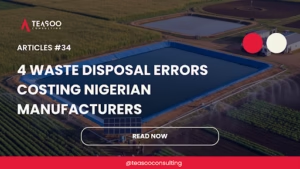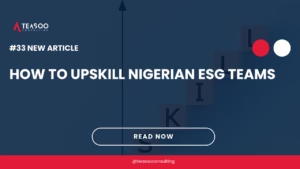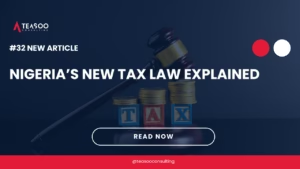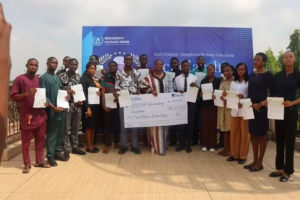#3 Navigating ESG Compliance: Understanding ESG Compliance Obligations in Nigeria

Compliance is key! Learn about Nigeria’s ESG obligations and how they impact your business.
Is your company truly ESG-ready—or just ticking boxes?
- A 2025 RegTech Africa report revealed that more than 70% of institutional investors in Africa now integrate ESG metrics into their investment decisions, especially in sectors like energy, mining, and agriculture.
- In 2023, MTN, Seplat Energy, Access Bank, and Fidelity Bank became the first Nigerian firms to publish ESG reports using the IFRS S1 and S2 standards, signaling a shift from voluntary CSR to structured ESG compliance.
- As of 2024, Nigeria is one of 30 jurisdictions representing 57% of global GDP and over 50% of global greenhouse gas emissions that are adopting or planning to adopt the IFRS Sustainability Disclosure Standards (S1 and S2). Nigeria’s Financial Reporting Council (FRC) has already launched a phased roadmap for mandatory ESG reporting by 2028.
- At Teasoo Consulting, we’ve seen firsthand how ESG has evolved from CSR tokenism to a boardroom imperative. Here’s what Nigerian businesses need to know and do.
What is ESG Compliance—And Why It Matters in Nigeria
ESG compliance means aligning your operations with sustainable and ethical standards that consider environmental impact, social responsibility, and governance integrity.
In Nigeria, ESG is being propelled by:
- New regulations (CAMA 2020, NCCG 2018, PIA 2021)
- Investor scrutiny, especially from DFIs and multinationals
- Climate-related risks, like floods and droughts threatening 34 states
- Global alignment—ESG assets worldwide are projected to hit $50 trillion by 2025
Nigeria is under growing pressure to meet these standards. Companies that ignore them face regulatory, financial, and reputational risk.
ESG in Nigeria: A Quick Landscape Overview
Environmental Pressures
- Climate: Net-zero by 2060 will cost Nigeria $1.9 trillion (ETP)
- Pollution: $8.1B lost annually due to poor waste control (World Bank, 2023)
- Deforestation and energy poverty complicate transition efforts
Social Realities
- 70M+ Nigerians live in extreme poverty
- Fewer than 20% of board seats in listed firms are held by women
- Community tensions from poor engagement, especially in extractive sectors
Governance Gaps
- ESG rules are fragmented across several laws and codes
- Greenwashing is prevalent due to lax enforcement
Evolving Regulations and Investor Expectations
- IFRS Sustainability Disclosure Standards (S1 & S2) adopted with phased rollout by 2028 (public entities) and 2030 (SMEs)
- Nigerian Exchange (NGX) Sustainability Guidelines
- Lagos State ban on single-use plastics Climate Change Act & Petroleum Industry Act (PIA) push environmental and community accountability
💡 Teasoo Tip: Compliance is the floor—not the ceiling. True ESG leadership creates measurable impact.
Challenges of ESG Compliance in Nigeria
- Capacity gaps: Shortage of trained ESG professionals, especially in SMEs
- Fragmented regulation: Conflicting mandates from NESREA, SEC, NGX, etc.
- Data problems: Manual reporting, poor digital infrastructure, lack of localized ESG metrics
- High cost: ESG assurance and tools remain unaffordable for many SMEs
- Weak enforcement: Many firms escape scrutiny, leading to widespread greenwashing
What Nigerian Businesses Should Do—Now
- Conduct ESG Readiness Assessments Regularly assess compliance gaps (Map your risks, obligations, and opportunities—industry-specific) using frameworks like NGX Guidelines and IFRS Sustainability Standards.
- Align with and Adopt Global Standards Use tools like IFRS S1/S2, GRI, SASB, or NGX Sustainability Disclosure Guidelines for consistent and transparent reporting.
- Build Internal Capacity Build internal capacity (leadership team and staff) through ESG-focused training programs.
- Integrate ESG Into Strategy Embed ESG principles into core business strategy, not just reporting.
- Engage Stakeholders Collaborate with regulators, investors, host communities, and employees to build trust and ensure compliance.
- Leverage Technology Use digital tools for ESG data collection and analytics.
- Partner for Progress Work with technical experts (like Teasoo Consulting) to co-develop roadmaps and meet investor-grade expectations.
The Outlook: ESG as a Competitive Advantage
Nigeria’s ESG terrain is maturing. Regulatory reforms, investor expectations, and sustainability demands are reshaping how businesses operate. Early adopters are already unlocking access to capital, market entry, and talent.
ESG is not a Western fad—it’s a Nigerian business reality. The question is no longer if your company should embrace ESG, but how fast you can get there.
Ready to assess your ESG readiness or need help developing a credible compliance roadmap? Teasoo Consulting is here to support your journey toward sustainable, responsible, and profitable growth.






